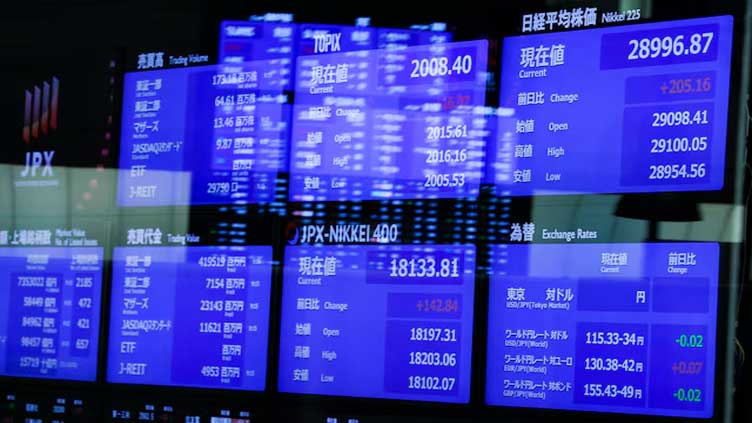World shares start 2025 with a wobble on Trump trepidation

Business
World shares start 2025 with a wobble on Trump trepidation
LONDON/SINGAPORE (Reuters) - World shares struggled for traction on Thursday after a jittery close to 2024, while the dollar weakened as investor sentiment dithered ahead of Donald Trump's return to the White House.
The start of the New Year was shaping up to be a less favourable one for equities, as uncertainty over the policies of incoming US President Trump and a more hawkish Federal Reserve outlook looked set to dominate market rhetoric for now.
Global shares, which had closed out 2024 with a strong annual gain of nearly 16%, clocked a monthly loss of more than 2% in December and ticked 0.05% lower after the European open.
European stocks eased during their first trading session of 2025 with the pan-European STOXX 600 index last down 0.25%.
U.S. stock futures pointed higher, however, as S&P 500 futures edged 0.6% up while Nasdaq futures advanced 0.8%.
Wall Street lost ground on Tuesday as investors closed the book on a remarkable year for equities.
China stocks ended sharply lower, logging their weakest New Year start since 2016, as factory data disappointed investors who were also waiting for more policy support.
Global markets are kicking off 2025 with a sharp focus on key economic and inflation indicators, said Bruno Schneller, managing director at Erlen Capital Management in Zurich.
"The latest PMI release from China, falling short of expectations, underscores challenges in the manufacturing sector. However, President Xi’s announcement of more proactive policies to boost growth signals potential shifts in economic strategy for the region," added Schneller.
China's Xi Jinping said on Tuesday in his New Year's address that the country would implement more proactive policies to promote growth in 2025.
Investors are closely monitoring China's recovery with Trump's talk of tariffs in excess of 60% on imports of Chinese goods potentially posing a significant headwind.
"With Donald Trump's return to the White House amplifying external risks and an already fragile domestic economy, a debt-deflation trap leading to a generational downturn could be perilously close if upcoming stimulus measures are delayed or misdirected," said Yingrui Wang, China's emerging market economist at AXA Investment Managers.
LEVYING TARIFFS
Trump will be sworn in as U.S. president on Jan. 20 for his second term in office. Friday will see the new session of Congress begin, with a Republican majority in both the House of Representatives and the Senate.
"A big question will be how the new administration moves on new tariffs, and which countries they’re focused on," Deutsche Bank analysts said in a note.
The dollar wobbled against other major currencies, down 0.1%. The euro ticked 0.08% higher to $1.03615 but strayed not too far from a more than one-month trough.
Markets now price in about 42 basis points worth of rate cuts from the Federal Reserve this year, compared with more than 100 bps from the European Central Bank and 60 bps from the Bank of England.
In London trade, U.S. 10-year Treasury yields were down around 3 bps at 4.22%.
Oil prices rose with Brent crude futures up 32 cents to $74.96 a barrel. U.S. West Texas Intermediate crude gained 31 cents to $72.02.
Spot gold traded 0.5% higher at $2,636 an ounce. The yellow metal had a banner year in 2024, surging more than 27% in its largest annual gain since 2010.
Russian gas exports via Soviet-era pipelines running through Ukraine came to a halt on New Year's Day, marking the end of decades of Moscow's dominance over Europe's energy markets.
The gas had kept flowing despite nearly three years of war, but Russia's Gazprom said it had stopped at 0500 GMT on January 1, after Ukraine refused to renew a transit agreement.
The benchmark front-month contract at the Dutch TTF hub <TRNLTTFMc1> hit a 14-month high at 50.85 euros per megawatt-hour (MWh) by 0913 GMT, according to LSEG data.


